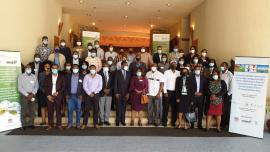Background
Climate research in Africa is fragmented and not demand-driven. As such, it is not responsive to the user needs, and needs to be firmly situated within the contexts of Agenda 2063, Sustainable Development Goals (SDGs) and the Paris Agreement. The intensity and frequency of disruptions in natural and socioeconomic systems caused by climate change require African-led demand-driven researches in the areas of mitigation, adaptation, resilience building, as well as capitalizing on emerging opportunities. The Climate Research for Development (CR4D) initiative represents a paradigmatic shift to address these gaps and situate climate research into the broader development context.
The CR4D is an African-led initiative supported by partnership between the African Climate Policy Centre (ACPC) of the United Nations Economic Commission for Africa (UNECA), the African Ministerial Conference on Meteorology (AMCOMET), the World Meteorological Organization (WMO), and the Global Framework for Climate Services (GFCS) to strengthen links between climate science research and climate information needs in support of development planning in Africa. The initiative is governed through the Oversight Board, the Scientific Advisory Committee (SAC), and the Institutional Collaboration Platform (ICP) where the African Climate Policy Center is the CR4D Secretariat.
Workshop Objectives
The overall objective of the training of trainers workshop is to introduce the current state of arts in objective sub-seasonal and seasonal forecasting and enhance experts capacities in using ICPAC’s
objective monthly and seasonal climate forecasting tools for agricultural sector. The specific objectives are to:
- Introduce the concept of objective monthly and seasonal climate forecasting for NMHS and agriculture and food security experts and practitioners from ESA;
- Provide hands-on training on ICPAC’s objective forecasting tools;
- Enhance capacity of experts in the interpretation of new seasonal forecast products for better resilience and adaptive capacity in agricultural sector;
- Strengthen south-south collaboration and climate knowledge sharing between Eastern and Southern African countries and regional organizations.
Expected Outputs
The main results include:
- Capacity of trainers/experts in understanding and implementation of ICPAC’s objective seasonal forecasting system/tool built;
- Utilization of objective seasonal forecast products in agricultural sector will be increased;
- Strong south-south collaboration between various national and regional organizations in ESA established;
- Workshop report.
Documentation
Presentations
The Eastern and Southern African Climate Variability Titike K. Bahaga
Evolution of CLIMSOFT Climate Data Management System: Albert S. Mhanda
Introduction to Linux and working on ICPAC high computing cluster (HPC)
Good practices for developing objective seasonal outlooks: Zewdu Segele
Procedures to generate seasonal forecasts using ensemble regression
WRF forecast products at ICPAC
Concept of Co-production - Calistus Wachana
South African Weather Service – Weather and Climate Services – MarryJane Bopape
Co-design and delivering of climate information at S2S time scale - Pokam Mba Wilfried
Group Discussion


